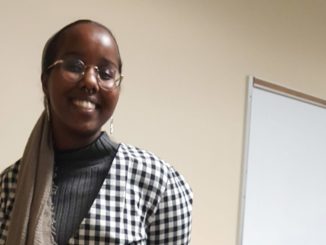
Bashar Abdulrazzaq for ENG 105
“There is no honorable way to kill, no gentle way to destroy. There is nothing good in war except its ending.” Abraham Lincoln said this because he lived through the American Civil War. I know this because I went through war, too.
In 2003, I was sixteen years old. Like the many boys in my neighborhood, I loved soccer. We used to play it every day at school, and as soon as we were out of school we were out of our houses, yelling and keeping score. At first, we did not have a place to play. One day I found a field close to our home. The field was full of trash and rocks. It was filled with burrs that stuck to our legs and scratched our skin. The area looked bad, but we saw the potential in it. We worked hard on it with borrowed tools. We took out the rocks and smoothed the ground, making the area level to keep us from getting hurt. All the boys wanted to be the boss. They all had an opinion about how to do things. Adults in the neighborhood saw we were making the park useful again. Maybe because they believed in our project, or maybe they were just tired of us playing in the street and breaking their windows, so some of the adults joined in on the project. It took us a long sweaty week to finish the project. In the end we had a place to play, and we had a team with a name, Al Nawaras, The Seagulls.
On March 15 that year I came home from school. I planned to just eat and then join my friends at the field. I found my father sitting with my mother in the living room, talking seriously. I heard my dad say, “There is no school tomorrow. War is coming.” I heard that, and I was happy. I had no idea about war, but I was happy I did not have to go to school the next day. My father also said we must leave Baghdad and go to my dad’s family in the country. He rented a van, and my mom started packing food and clothing for our trip.
“I will stay at home,” my dad said. Wherever there was danger, my father never gave it his back.
I did not like the idea of staying home alone with my dad. He was strict about the rules when we were alone together, but I wanted to stay and play with my friends. I made a big scene about wanting to stay home. Finally, my dad relented, promising my mom that he would protect me and follow behind to the country if things got more dangerous. I felt I had won. Then, just as she was packing the last things into the car, my mom mentioned that the girl I liked, and her family did not have any family in the country. They were going to travel with my family and stay in the country, too. My crush on her beat out my desire to be with my friends.
“I think I will go,” I told my dad. “I think that it will be dangerous if I stay here.” I tried to sound grown up and reasonable. I didn’t tell them the truth about what changed my mind.
“No,” said my dad. “This is not a game. You made your choice. Now you will stay.”
I dropped my adult personality and became a kid again. I started crying and wailing, “Nobody cares if I die in this war!”
Finally, after I lost all my dignity in front of the girl I liked, just as the van was pulling out, my father gave up. He did not want to listen to me crying and screaming so he let me climb into the van with the rest of my family. I sat by the window next to one of my brothers. I tried not to look at the girl I liked sitting right behind me since my tears were not yet dried.
I was not worried that my dad was staying. I always saw my dad as someone above a hero. I knew he would be safe. And him staying meant I would have freedom going to the country. He was really strict about the family culture, so I was excited that I would be getting an unexpected vacation from both school and my dad’s rules.
My mom wasn’t excited like me. Driving was different this time than times before. Through the window seat I saw a lot of families also leaving Baghdad. For the first time I saw a lot of soldiers in the streets. We saw tanks and vehicles with rockets mounted on them. That was when I started thinking something big was going on. My mom saw this out her window, too.
“A lot of people will soon lose their life,” she said.
That was scary for me. I saw Baghdad in a way I had never seen it before. It was a sad day for all the people I saw. My happiness started to shift to worry.
After we arrived at the house where we were to spend our time during the war, we found the well we were going to use if the water turned off. I only knew water coming straight out of our faucets in my home, but the government had warned us all that we needed to make sure that we had enough water in case the supply was cut. The people, like my parents, who had lived through earlier wars knew that one way to make people give up was to cut off their water and make them thirsty. I just thought the well was cool, with its pump and its freezing cold water. The small house was on a farm, with trees around us everywhere. I liked the house. My only hope was to spend a few days in this beautiful house. I hoped no war would ruin it.
On March 19, around 2 a.m., I was sleeping on the floor on pallets with my family. We had been up late, talking and joking. In my sleep I heard a great explosion. It woke me up. The sound of the explosion was so loud for me, it seemed to be next to the house. The concrete walls were shaking and one of the windows broke. The pressure in the room had changed with the force of the explosion. I saw all my family was up, too. My mom was opening windows to keep the rest from shattering. Everybody else was looking out another window to see what happened.
After a few nervous hours, we fell back to sleep, but we did not sleep well.
It was the first of many long nights. My mother would not let us sleep next to the windows because she was afraid that they would break on us. But after a while, we learned to sleep through the explosions.
After 21 days the explosions stopped. During this time, we did not hear from my father once. I was not concerned, but my mom was really worried. Then, one day he showed up. He wasn’t wearing his usual Arabic red and white head cloth. His head was bare. In his family’s culture, this was a sign of sadness. “The war is over,” he said. “It’s time to come home.” But he told us he would not put the cloth back on his head as long as Iraq was ruled by people from outside of Iraq.
On our way home was the first time in my life I saw corpses of humans in the street. Unlike the trip out of Baghdad, the trip home was quiet. No one played music. No one talked or joked. I forgot about the girl I liked. Everywhere was silent with sadness.
This was the worst picture I had ever seen in my sixteen years. I did not know that it was possible for the war to last another seventeen years. I did not know it was possible that I would see things that were so much worse.
Because of this war, my father is gone. He will never stand in front of me again with his strict rules and his red and white scarf. Because of this war, five of The Seagulls were killed before they turned twenty. Because of this war, the field we worked so hard to clean for soccer was taken back by neighbors wanting to protect our area. We didn’t play anymore. We couldn’t. Instead, we built a small shed where we could watch for danger coming into our neighborhood. I lost family and friends. But most of all, I lost my childhood.
I remember one of my neighbors who used to yell at us to take our games out of the street. I cry when I remember her, standing in the quiet streets. One day, after so many children were killed, she called me over. Instead of her usual yell, she was crying. “I wish that you kids were bothering me again,” she said to me.
Abraham Lincoln said that the only good thing about war is its ending. I honestly don’t see an end of war in sight. I do not believe that governments will ever look for peace. But I believe in community. In the same way that we turned a trash-filled field into a place where neighbors can come together to play, I believe that the people who are most impacted by war can come together and rebuild the world into a place of peace and hope. In the Hadith from Prophet Muhammed (PBUH) said that, even if the Day of Judgment is coming, if one of us has a seedling or a palm shoot in our hands and we have a moment to plant it, we should. Now is the time for us to come together and clear the fields. Now we should plant the seedlings we hold in our hands.


Be the first to comment